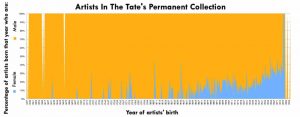| Seven Days of Social Science Research |
|---|
|
If you have not yet seen Seven Days of Social Science Research, then please check it out! Produced by the UK’s Economic and Social Research Council, this video compilation offers seven short (5-8 minute) examples of Social Science research in various disciplines: Monday’s Child: Image and Identity Tuesday’s Child: Charity Wednesday’s Child: Poverty and Inequality Thursday’s Child: Migration Friday’s Child: Family and Relationships Saturday’s Child: Work and Employment Sunday’s Child: Happiness and Wellbeing |
| The Joy of Stats, Hans Rosling |
|
This recommendation is likely repeating the obvious, but we must include it: The Joy of Stats. Hans Rosling’s excitement for data is fun and a nice change of pace for QM students. (Tip: I often show the video in two parts. The first thirty minutes early in the course, and the second thirty minutes only after I have introduced the Normal Curve.) Other wonderful presentations by Hans Rosling are found at TedTalks: The Best of Hans Rosling. |
| Visualizing Data, Mona Chalabi |
Data journalist Mona Chalabi suggests that exact visualization of data might numb our brain to uncertainty and reduce our ability to judge the validity of the data presented. Instead, she prefers hand-drawn or more artistic visual data. Here are examples of her work:  Stinson, Liz. (2017). The Nerdy Charm of Artisinal, Hand-Drawn Infographics. Wired
Stinson, Liz. (2017). The Nerdy Charm of Artisinal, Hand-Drawn Infographics. Wired   Chalabi, Mona. Museum art collections are very male and very white. The Guardian Watch Mona Chalabi’s TedTalk, 3 Ways to Spot a Bad Statistic. The artwork from Mona Chalabi is related to her review of academic work concerning how much space women artists occupy in major public museums. Read about it in The Guardian. |
| Social Science Space |
|
We want you to know about Social Science Space sponsored by SAGE publishers. The issues explored by Social Science experts are current, relevant and provocative—perfect for engaging students in our Methodology courses. For example, as I write this summary, the following articles/links are found on the homepage: Why Social Science? Because We Will Need to Do Better in the Next Crisis A Collection: Behavioral Science Insights on Addressing COVID’s Collateral Effects How Can Wise Graphics Use Cut Through the Complexity of COVID-19 Rodney Coates outlines a 12-Step Program for Decolonizing Academe Free Resources on Structural Racism Self and Social: An Interview About Autoethnography Article Collection Examines How to Prevent Police Killings The Podcasts are of special interest. Since 2012, Social Science experts have contributed to Social Science {bites}. Its host, David Edmunds, writes: The social world is a world we create, that we all have in common. In this series of illuminating podcasts, hear leading social scientists present their perspectives on how our social world is created, and how social science can help us understand people and how they behave. Each podcast includes a downloadable written transcript of the conversation.
Explore the many options available, but here are 10 that struck us as especially interesting. David Halpern on Nudging, January 2, 2019 (experimental psychology) What is nudging? According to David Halpern it is “placing more nutritious food on a more visible shelf, informing lagging taxpayers that their neighbors have already paid up, or asking job seekers what they plan to do next week (instead of what they did – or didn’t – do last week).” Experimental psychologist David Halpern, chief executive of the United Kingdom’s Behavioural Insights Team, discusses the importance of how and why nudging shapes human behaviour. Ashley Mears on the Global Party Circuit, June 1, 2020 (Interviews and Field Work) Rich men, promoters and “pretty girls” is the triangular relationship of the world’s richest partiers. Ashley Mears is a professor of sociology and women’s, gender, and sexuality studies at Boston University. She shares her findings from 18 months of field work and interviews with the promoters. Susan Michie on Behavioral Change, January 7, 2020 (algorithms, machine learning and qualitative analysis) Clinical and Health Psychologist at University College London, Susan Michie investigates the behavioral change and discusses the ethics of behavior change. She believes “algorithms and machine learning will be “absolutely vital” to parse through all the relevant data.” Anne Case on Deaths of Despair, May 7, 2020. (quantitative data) Anne Case is the Alexander Stewart 1886 Professor of Economics and Public Affairs, Emeritus at Princeton, where she directs the Research Program in Development Studies. She shares her research into why “mortality among middle-aged, non-college-educated white Americans rose, stalled, then rose again.” Her evidence leads her to conclude opioids and broader problems within the US health care system are roots of the problem. Richard Layard on Happiness Economics, February 2, 2020 (Qualitative analysis vs. Quantitative Analysis) Richard Layard founded the Centre for Economic Performance at the London School of Economics in 1990. Since 2000 he has focused his attention on happiness and mental health. In this podcast, Professor Layard explains how qualitative questions related to happiness has proven to be more accurate than predictions based on the economy. He states: “Bill Clinton said, ‘It’s the economy, stupid.’ I’m afraid he was the stupid one. … It is pretty clear in our mental fabric that how you feel is of ultimate importance, and these other things [such as wealth or health] are a means to that end.” Ruth Wodak on How to Become a Far-Right Populist, March 2, 2020 (observation and content analysis) Sociolinguist and senior visiting fellow at Vienna’s Institut für die Wissenschaft des Menschen, Ruth Wodak argues that one of the hallmarks of far-right populism is retrotopia, or “a nostalgia for a past where everything was much better.” To this first characteristic, Wodak then discusses five more elements nativism, scapegoats, anti-elitism, law and order, and cultural touchstones. Shona Minson on Children of Imprisoned Mothers, October 2, 2019 (Oral Interviews of children, caregivers and judiciary) Shona Minson formerly practiced criminal and family law and is now a British Academy post-doctoral fellow at the Centre for Criminology at the University of Oxford where she studies children’s rights as related to custodial sentencing. Minson shares her findings of oral interviews with the children of mothers who were incarcerated. She also interviewed the caregivers and members of the Crown Court judiciary. Her goal is to understand the effect of the mother’s incarceration on the child. Kayleigh Garthwaite on Foodbanks, August 1, 2019 (Immersive Ethnography) Social scientist Kayleigh Garthwaite examined the quantitative data, but she wanted to know more about the people’s experience using a foodbank. She asked herself, “What was it like for people to go to the foodbank? Why did they go there? Was there any stigma or shame?” To find out, Garthwaite engaged in some immersive sociology and volunteered to work at a Trussell foodbank. She went to the foodbank in northern England’s city of Stockton, deploying ethnographic methods to learn from the workers and the food recipients. Jonathan Portes on the Economics of Immigration, July 1, 2019 (quantitative analysis) Jonathan Portes is a professor of economics and public policy at the School of Politics & Economics of King’s College, London, and the former chief economist at the Cabinet Office. Portes explains the “lump of labor fallacy” — that there’s only a certain number of jobs to go around when in fact the number of jobs in an economy is not fixed – often plays out in the popular debate on immigration. “The key here,” Portes adds, “is that immigration leads to demand as well as supply.” Michele Gelfand on Social Norms, November 1, 2019 (observational and content analysis) Michele Gelfand, Psychology Professor and director of the interdisciplinary Culture Lab at the University of Maryland, analyzes the idea and practice of social norms. What are the ties that bind and how loose or tight are they? Her approach is multidisciplinary: “We work with computer scientists, neuroscientists, political scientists, and–increasingly–biologists to understand all things cultural.” |
Methods Courses
The following resources have been gathered together by teachers from the Social Sciences Department, and they offer a solid foundation for understanding standard approaches to research within the social sciences.
